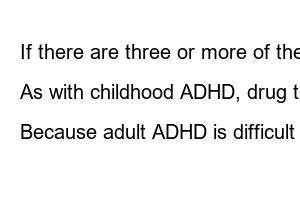성인 ADHD 증상This is a case of ‘Attention Deficit/Hyperactivity Disorder (ADHD)’ that occurs in children and adolescents and persists into adulthood. Adult ADHD, unlike childhood, shows more symptoms of inattention rather than hyperactivity or impulsivity, and this is considered an individual’s tendency, making it difficult to recognize the disease. However, if left untreated, it is a disease that needs to be looked at carefully as it can interfere with work ability and interpersonal relationships, lowering the quality of life and causing depression.
◎ About, Adult ADHD
Adult ADHD is when ADHD symptoms from childhood and adolescence remain into adulthood. ADHD Part of the frontal lobe, which has the function of suppressing concentration and impulses, does not function properly, resulting in strong hyperactivity and impulsivity.
ADHD is generally known to improve as one grows and disappear in adulthood, but if it is not treated properly, it can persist into adolescence and adulthood. The Korean Academy of Child and Adolescent Psychiatry estimates that adult ADHD patients account for approximately 2-4% of the total population.
They often have difficulty adjusting to society because they have difficulty controlling their emotions and have difficulty at work and in interpersonal relationships. As a result, it can easily lead to depression, and if ADHD is not treated, depression treatment may not proceed well, so an accurate diagnosis is necessary.
◎ About, Causes of ADHD in Adults
The biggest causes of ADHD include genetics and congenital brain development defects. For this reason, it occurs because the function of the frontal lobe, which controls emotions and suppresses impulses, does not function normally. In fact, research results have reported that when comparing the areas of the cerebral cortex and prefrontal cortex of children with ADHD with those of normal children, their development is about 2 to 3 years behind. This can be improved as the cortex develops as the child grows, but in some cases, sebum development is not fully developed due to lack of treatment, and the symptoms remain until adulthood. This is adult ADHD.
Some argue that repeated exposure to strong stress may interfere with brain activity, resulting in acquired ADHD symptoms.
◎ About, Adult ADHD Symptoms
The main symptoms of ADHD in children include △selective concentration △lack of patience △emotion control disorder △difficulty staying organized △unplanned thinking and behavior △hyperactivity.
Adults also show similar symptoms, but impulsivity and hyperactivity are reduced, and inattention and lack of concentration are more pronounced. Therefore, unlike in childhood, it is not easy to recognize the disease, so it is also called ‘silent ADHD’.
Usually, it does not show problems in daily life, but it may be suspected if you have difficulty starting or completing tasks, are very forgetful, or make frequent mistakes. Also, contrary to the prejudice that they have low concentration, they sometimes show excessive concentration in certain areas and suffer from severe stress due to the obsession with having to do their work perfectly. This tendency is stronger in female patients. In addition, impulsive overspending, frequent drinking, lack of patience, and lethargy are also symptoms that may indicate adult ADHD.
Unlike childhood patients who had academic difficulties, adult ADHD patients often show smart and creative aspects. Therefore, it is not possible to determine whether an adult has ADHD based on cognitive ability alone.
◎ About, Adult ADHD Self-Check Symptoms
1 It is difficult to concentrate on work or conversation for a long time.
2 I have difficulty waking up in the morning and am often late for appointments.
3 I often lose things and forget my schedule more often than other people.
4 There have been one or two unplanned spending days in the past three months.
5 Avoid or postpone troublesome tasks as much as possible.
6 I am not good at financial investment due to my lack of economic concepts.
7 I have been addicted to alcohol, games, gambling, etc. for more than 6 months.
8 The period of working at one job is shorter than that of others.
9 I have heard that my mood changes easily and I am very emotional.
10 Sometimes I feel lethargic and lazy.
If there are three or more of these, consultation with an expert is required.
◎ About, adult ADHD treatment
As with childhood ADHD, drug treatment is administered. The drugs ‘methylphenidate’ and ‘atomoxetine’ are usually prescribed, but if you have heart disease or high blood pressure, it may be difficult to prescribe them. Counseling therapy and cognitive behavioral therapy may also be provided in conjunction with drug treatment.
Adult ADHD patients often suffer from conditions such as depression, anxiety, and addiction. Therefore, good treatment effects can only be expected if comprehensive treatment for accompanying diseases is carried out.
Because adult ADHD is difficult to recognize, patients often do not receive treatment and have a hard time blaming themselves for their tendencies. Because of this, it can develop into severe depression and greatly reduce the quality of life. However, this is a ‘disease’ that improves with treatment, so if you suspect it, you should seek out a specialist for diagnosis and actively engage in treatment.

